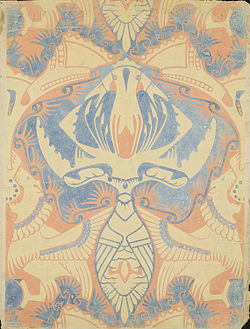Retro style
- Retro may also mean Retrorocket.

Retro, short for retrospective, is a modern term used to describe things from a bygone era. It is often used in a positive sense, referring to quirky or attractive products that are no longer available. For example, "Retro fashion" or "Retro Chic" may consist of outdated styles, such as tie-dyed shirts from the 1960s, or poodle skirts from the 1950s. A love of retro objects (things from the past) is called retrophilia.
Retro, both in popular and in legitimized culture, can be seen as an uncritical exaltation of the past, used as a weapon against contemporary cultural forms. Retro is uncritical because it sees itself as a return to a lost authenticity, to basic values which somehow have been corrupted by later evolutions.[citation needed]
A critical attitude towards both the legitimate and the non-legitimate would then be what is called camp. Camp is an ironic attitude, an explicit re-introduction of non-dominant forms. It claims legitimacy, but instead of aiming at timelessness, it wants to live only a short life. It does not want to present basic values, but precisely to confront culture with its waste, to show how any norm is historical.
An example of Retro computing is the IBM 1130 computing system from 1966 which still has a following of interested users, albeit mostly via a simulator rather than the real thing.
Retro gaming is a pastime which is becoming increasingly popular where individuals play video games on vintage computers and games consoles; although the idea of what constitutes a vintage or retro machine is one open to debate.
Retro cars are newly designed cars such as the PT Cruiser, Plymouth Prowler, MINI, New Beetle, or 2005-present Ford Mustang that take many of their style cues from (respectively) the Chrysler Airflow, the 1932 Ford, the Austin Mini, the VW Bug, and 1965-70 Ford Mustang without using any of the original technologies.
"Retro" is also the name of a Rick Wakeman CD released in 2006.
See also
References
- Jim Collins, 1989: Uncommon Cultures. Popular Culture and Post-Modernism, Mew York/London: Routledge.
- Umberto Eco, 1986: Travels in Hyperreality, New York: Harcourt.
- Umberto Eco, 1988 (1964, 1978): The Structure of Bad Taste, Amsterdam: Bert Bakker.
- Clem Robyns, 1991: "Beyond the first dimension: recent tendencies in popular culture studies", in Joris Vlasselaers (Ed.) The Prince and the Frog, Leuven: ALW, 14-32.
- Andrew Ross, 1989: No Respect. Intellectuals and Popular Culture, New York/London: Routledge.
